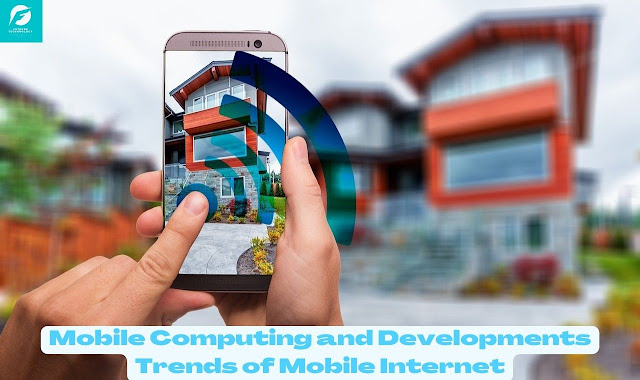 |
| Mobile Computing and Development Trends of Mobile Internet |
Mobile Computing and Environment
Using mobile terminals, distributed
computing through wireless information networks and remote servers is called
mobile computing User.
Computing User
The environment in which the mobile
terminal is located is called the mobile computing environment.
. It is mainly based on the wireless
network, supports mobile users to access network data, and realizes a
distributed mobile computing environment with unconstrained, free communication
and sharing. The mobile computing environment consists of the server, mobile, and
network.
Common wireless networks
Wireless personal network
Wireless local area network
Wireless Metropolitan Area Network
Cellular mobile communication
1. Cellular mobile communication
Cellular mobile communication is also known
as cell-based mobile communication.
Its characteristic is that the entire
large-scale service area is divided into many cells. Each cell is set up with a
base station, which is responsible for the contact and control of each mobile
station in the cell. Each base station is connected to the other through the
mobile conversion center and is connected to the local office.
2. Positioning of cellular mobile
communication
The positioning technology in mobile
communication determines the position of the measured object by measuring some
parameters of the radio wave and according to a specific algorithm. The
measurement parameters generally include the transmission time, amplitude,
phase, and angle of arrival of the radio wave.
Features of mobile communication
Mobility, complex radio wave propagation
conditions, serious noise and interference, complex system and network
structure, good equipment performance, large system capacity, good
communication quality, high-frequency band utilization, suitable for multimedia
communication systems, and low mobile phone transmit power.
Sensor Networks
A sensor network is a self-organizing
distributed network system composed of a large number of ubiquitous tiny sensor
nodes with wireless communication and mobile computing capabilities. It is a system
that can autonomously complete specified tasks according to the environment.
Developments Trends of Mobile
Internet
The People's Daily Online Research
Institute recently released the 2013 Blue Book of China's Mobile Internet,
arguing that in just a few years, the mobile Internet has penetrated all
aspects of social life and has had a huge impact, but it is still in the early
stages of development, and "changes" " is still its main
feature, innovation is its main trend.
 | |
|
Its six major development trends in the future are:
First, the mobile Internet surpasses the PC Internet
and leads the new trend of development. Wired Internet (also known as PC Internet,
desktop Internet, and traditional Internet) is the early form of the Internet,
and mobile Internet (wireless Internet) is the future of the Internet. The PC
is only one of the terminals of the Internet. Smartphones, tablet computers,
and e-readers (electronic paper books) have become important terminals.
Televisions and vehicle-mounted devices are becoming terminals. Refrigerators,
microwave ovens, range hoods, cameras, and even glasses, and wearables such as
watches may become pan-terminals.
Second, the integration of mobile Internet and traditional industries, giving
birth to new models. Driven by
new technologies such as mobile Internet, mobile computing, and the Internet of
Things, the integration of traditional industries and the Internet is showing
new characteristics, and platforms and models have changed. On the one hand,
this can be used as a means of business promotion, such as APPs and corporate
promotion platforms in traditional industries such as food, catering,
entertainment, aviation, automobiles, finance, home appliances, etc. On the
other hand, it also reconstructs the business model of mobile terminals, such
as medical, education, tourism, transportation, media, and other fields of
business transformation.
Third, the user experience of
different terminals is more valued, helping the popularization of mobile
services to take root. In
2011, the mainstream smartphone screen was 3.5-4.3 inches, and in 2012 it
developed to 4.7-5.0 inches, while the tablet PC is fashionable with the mini
type. However, mobile terminals with different screen sizes have different user
experiences. Web pages adapted to smartphones with small screens should be
lightweight and lightweight, and the advertisements it carries must also meet
this requirement. At present, a large number of Internet services have been
migrated to mobile phones. To adapt to tablet computers, smartphones, and
different operating systems, different APPs have been developed.
Self-adaptation solves the problem of reading experience well, but it is far
from being portable, Lightweight, user-friendly, and lacks a good user
experience.
 |
| Mobile Computing and Development Trends of Mobile Internet |
Fourth, the business model of the
mobile Internet was diversified, and the segmented market continued to exert
its strength. As the
development of the mobile Internet enters the fast lane, a solid foundation has
been laid for the network, terminals, users, etc., the unprofitable situation
has begun to change, and the mobile Internet has been integrated into the
mainstream life and business society, and the wave of monetization is coming.
The ability to monetize the traffic in business models such as mobile games,
mobile advertising, mobile e-commerce, and mobile video has rapidly improved.
Fifth, users expect cross-platform
interconnection, and technology is full of expectations. The three major systems currently formed: iOS,
Android, and Windows Phone are independent, relatively closed, and fragmented.
Application service developers need to adapt and develop multiple platforms.
This isolation goes against the spirit of Internet interconnection. Smartphones
of different brands and even mobile terminals of different brands and types can
be interconnected, which is the expectation of users and a development trend.
Sixth, big data
mining has become a blue ocean, and the potential of precision marketing is
highlighted. With the
rapid improvement of mobile bandwidth technology, more sensing devices and
mobile terminals can access the network anytime, anywhere, and driven by
technologies such as mobile computing and the Internet of Things, China's
mobile Internet has gradually entered the era of "big data". The
current mobile Internet field is still dominated by location-based precision
marketing, but in the future, with the development of big data-related
technologies, people will continue to deepen data mining, and customized
application services and marketing methods for users will become the
development trend. , it will be another blue ocean of mobile Internet.
More Articles: Click Here












No comments:
Post a Comment